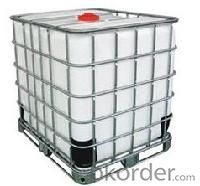Loading Port:Tianjin
Payment Terms:TT OR LC
Min Order Qty:25 m.t.
Supply Capability:6000 m.t./month
Sodium Hypochlorite
CAS NO: 7681-52-9
Chemical Formula: NaClO
Molecular Weight: 74.44
Appearance: Yellow transparent Liquid
Standard: HG/T2498-1993
Specification:
Available Chlorine: 8%-16%
NaOH: 1% Max
Transportation Info:
Class: 8 UN NO: 1791 PG:III
Application:
Disinfection for swimming pool, drinking water, cooling tower and sewage and waste water, food, and farming, hospital, school, station and household etc
Good bleaching and oxidation in paper and dye industry.
Normal Packing: 30kg drum, 1200kg IBC Tank

(1)Sodium hypochlorite manufacturer
(2)Quick Logistics
(3) Available Chlorine: 10%, 12%, 14%, 15%, 18%, 20%
NaOH: 1% max
Hazardous Materials Transportation Regulations
Class Grade 8, UN1791, P.G. III
Production Standard: HG/T24981993
Properity:
1) Solid sodium chlorite is white or light yellow green, crystalline, alkaline, lightly absorptve humidity and easily solvable in water and alcohol.
2) The product is an oxidizng agent with high efficiency and an excellent bleaching ingredent, its afficiency is aqual to 10 times of bleaching powder.
3) The product is stable when stored under room tenperature or normal condition, its stability is bigger than sodiun hypochlorite and smaller than sodium chlorate.
4) When mixed solid sodium chlorite and alkaline solution are heated over 70 centigrade, it resoves chlorine hydrogen.
5) It is easily explosive, buring or poisinous when met, , bumped or rubbed with wooden bits, organic substance and reeductive substance.
Application: the product can be widely used as disinfectant, bleaching agent or
oxidant resulting from the available chlorine in the product, for example, it
has a wonderful disinfection for swimming-pool, drinking water, cooling tower
&sewage and waste water, food, and farming, Hospital, school, station and
household etc., good bleaching and oxidation are also found in paper and dye
industry.
Storage: Isolate from incompatible substances. Containers of this material may
be hazardous when empty since they retain product residues (vapors, liquid);
observe all warnings and precautions listed for the product